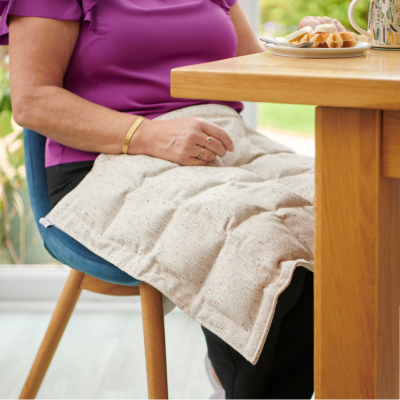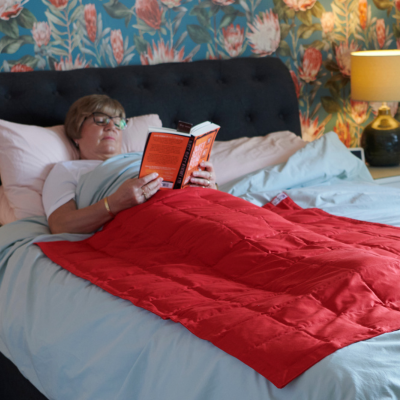Get exclusive deals you won't find anywhere else straight to your inbox.

How Weighted Blankets Benefit Individuals With Dementia
In this blog we will explore how weighted blankets benefit individuals with Dementia. Dementia is a complex and challenging condition that affects millions of people worldwide. It not only impacts cognitive function but can also affect behaviour and emotions.
While there is no cure for dementia, there are several strategies and therapies that can help improve the quality of life. One such therapy is the use of weighted blankets.
Understanding Dementia
www.dementiauk.org
Typical impairements include memory loss, disorientation, language difficulties and changes in mood and behaviour. It can also affect a person's ability to perform daily tasks. This can all lead to increased anxiety and agitation.
The Role of Weighted Blankets
Weighted blankets have gained recognition for their therapeutic effects on various conditions, including autism, anxiety, insomnia, and sensory processing disorders, but what exactly are they?
Weighted blankets are, in simplest terms, blankets filled with weight. They provide sensory feedback to the user. The weight is usually in the form of plastic beads, but can also be sand, steel shot or even corn seed.
They are typically made from fleece, cotton or neoprene. Available in a range of weights and textures, they are a popular choice due to a wide variety of benefits.
Benefits of Weighted Blankets for Dementia
Reducing Anxiety and Agitation
Individuals with dementia often experience heightened anxiety and agitation. This can be distressing for the individual and their caregivers.
Weighted blankets have a calming effect due to the comforting weight that is applied to the body. The weight stimulates the proprioceptive system, the awareness of our body's position and movement. Stimulating this system helps the body feel more grounded, calm and relaxed, reducing anxiety.
Improving Sleep Quality
Sleep disturbances are common in individuals with dementia. Weighted Blankets help create a soothing environment, ideal for sleep. It's this type of environment that is necessary for the body to relax, calm and prepare for sleep.
The gentle pressure from the blanket emulates a hug, creating a sense of comfort and security. This makes it easier for those with dementia to fall asleep and stay asleep longer.
Weighted Blankets are available in a range of fabrics. Traditional fleece and dimpled fleece blankets offer additional tactile texture which can encourage a more comforting environment, ideal for sleep.
Enhancing Sensory Processing
Dementia can alter sensory perception, causing discomfort or hypersensitivity to certain stimuli. Weighted blankets provide a consistent, gentle sensory input. This can help individuals with dementia better process and filter sensory information, making them feel more grounded and in control.
Increasing Body Awareness
As dementia progresses, individuals may become disconnected from their own bodies. Weighted blankets can help increase body awareness by providing tactile feedback and a sense of the body's boundaries. This helps promote a stronger connection between mind and body.
Promoting Social Interaction
Weighted blankets can serve as a comforting tool during social interactions. When used during activities like reading, talking, or watching TV, the blanket can help reduce restlessness and anxiety. This makes it easier for individuals with dementia to engage with their caregivers and loved ones. For a smaller, more portable product with the same benefits as a blanket, why not try a weighted lap pad.

Safe and Effective
When used as directed, weighted blankets are a completely safe and effective tool to help with a range of conditions.
They are safe to be used every night, however it's important that the user can self-remove the blanket. You should stop using them if the user shows any signs of discomfort or distress.
Conclusion
Weighted blankets have emerged as a valuable addition to the toolkit of therapies and interventions for individuals living with dementia.
While they may not be a cure, their ability to reduce anxiety, improve sleep quality, enhance sensory processing, and promote overall well-being can significantly impact the quality of life for those with dementia. They can also provide much-needed support for caregivers.
As always, it's essential to consult with healthcare professionals and specialists who can guide the appropriate use of weighted blankets tailored to the individual's needs and preferences.
With their comforting embrace, weighted blankets are proving to be a valuable resource in the journey of dementia care.
For more information on weighted therapy, refer to the Sensory Direct Weighted Therapy guide.


